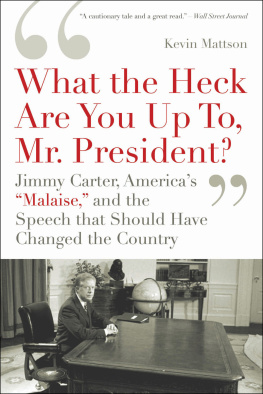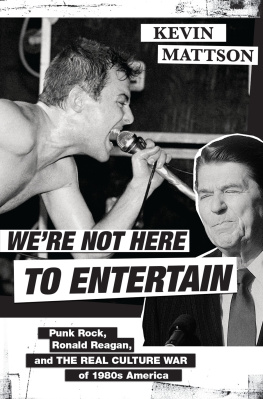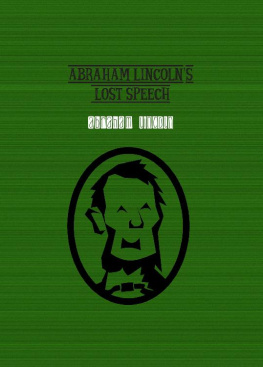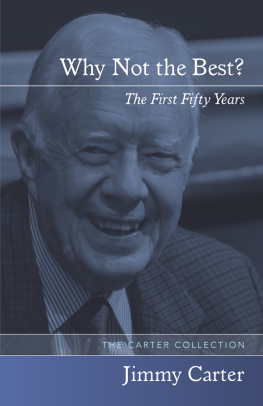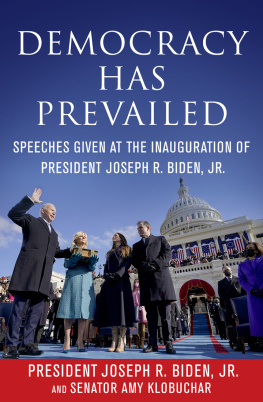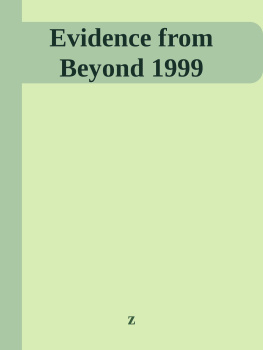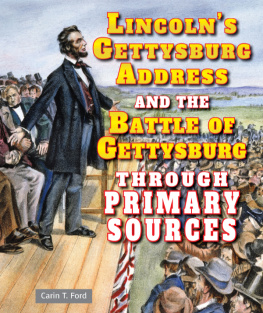MR. PRESIDENT?
Creating a Democratic Public: The Struggle for Urban
Participatory Democracy During the Progressive Era
Intellectuals in Action: The Origins of the
New Left and Radical Liberalism, 19451970
Engaging Youth: Combating the Apathy of
Young Americans Toward Politics
When America Was Great: The Fighting Faith of
Postwar Liberalism
Upton Sinclair and the Other American Century
Rebels All!: A Short History of the ConservativeMind in Postwar America
AS EDITOR
Democracys Moment: Reforming the AmericanPolitical System for the 21st Century
Liberalism for a New Century
WHAT THE HECK
ARE YOU UP TO,
MR. PRESIDENT?
Jimmy Carter, Americas Malaise,
and the Speech That Should Have
Changed the Country
KEVIN MATTSON

Copyright 2009 by Kevin Mattson
All rights reserved.
You may not copy, distribute, transmit, reproduce, or otherwise make available this publication (or any part of it) in any form, or by any means (including without limitation electronic, digital, optical, mechanical, photocopying, printing, recording, or otherwise), without the prior written permission of the publisher. Any person who does any unauthorized act in relation to this publication may be liable to criminal prosecution and civil claims for damages. For information address Bloomsbury USA, 1385 Broadway, New York, NY 10018.
Published by Bloomsbury USA, New York
Bloomsbury is a trademark of Bloomsbury Publishing Plc
LIBRARY OF CONGRESS CATALOGING-IN-PUBLICATION DATA
Mattson, Kevin, 1966
What the heck are you up to, Mr. President?: Jimmy Carter, Americas malaise, and the speech that should have changed the country / Kevin Mattson.1st U.S. ed.
p. cm.
Includes bibliographical references.
1. Carter, Jimmy, 1924Oratory. 2. Carter, Jimmy, 1924Political and social views. 3. RhetoricPolitical aspectsUnited StatesHistory20th century. 4. United StatesPolitics and government19771981. 5. Energy policyUnited StatesHistory20th century. 6. Petroleum industry and tradePolitical aspectsUnited States. 7. National characteristics, American. I. Title.
E873.2.M386 2009
973.926092dc22
2008054505
eISBN: 978-1-60819-139-0
First U.S. Edition 2009
To find out more about our authors and books visit www.bloomsbury.com. Here you will find extracts, author interviews, details of forthcoming events and the option to sign up for our newsletters.
CONTENTS
We have learned that more is not necessarily better, that even our great nation has its recognized limits, and that we can neither answer all questions nor solve all problems. We cannot afford to do everything, nor can we afford to lack boldness as we meet the future. So together, in a spirit of individual sacrifice for the common good, we must simply do our best.
JIMMY CARTER, INAUGURAL ADDRESS, 1977
WHAT THE HECK ARE YOU UP
TO, MR. PRESIDENT?
July 4, Independence Day, 1979: Sheets of rain fell on Washington, D.C., and suspense mounted. Would the nations biggest fireworks show proceed or be drowned? National Park Service officials huddled in rickety wood structures roped with plastic and decided around three P.M. to make an announcement: Please be patient. Then at five P.M., they announced an official delay. Four hours later, they canceled the show altogether.
Close by, a different celebration got under way: the annual smoke-in of the Youth International Party (Yippies), an organization founded twelve years earlier by counterculture celebrities Abbie Hoffman and Jerry Rubin. There was no Vietnam War to protest in 1979, of course, but the right to get high seemed as urgent as stopping a war. In Lafayette Park, across from the White House, scraggly young adults toked joints, swigged beer and Jack Daniels, and set off firecrackers. The rain turned the tangy smell of pot slightly mellower, but when the high wore off, the crowd went berserk. The mob scrambled over a large black fence onto the White House lawn. Cops pursued, dodging beer bottles flung at them. Nine arrests followed, one just a few feet away from the White House.
Perhaps it was fortunate fewer people were on the Mall to be disappointed by canceled fireworks or freaked out by police-hippie melees. Most gas stations in D.C. were shut down, not for the Fourth of July holiday but as a result of the decision by the Organization of the Petroleum Exporting Countries (OPEC) to cut exports to the United States. This was becoming a summer when people coasted or pushed their cars to stations often to find no gas. Stations with gas reported mile-long lines and three-hour waits. Most D.C. residents simply stayed home on July 4. Those who did search for gas raged. The greatest country in the world, one person on a gas line told an inquiring journalist, is stifled by a few sheiks.
An editorial in the Los Angeles Times on July 4 stated the obvious: This Independence Day, the holidays very name seems to mock us. The grand old document known as the Declaration of Independence trumpeted citizens rights to alter or abolish governments in face of a hostile world. Now this. Americans couldnt even get the third world to cough up enough gas to roll their cars out of driveways for traditional summer vacations. Stoned teenagers took over the White House lawn. Freedom seemed a cruel joke or an excuse for chaos. The conservative tabloid the New York Post intoned that on Independence Day, 1979 the American paradox is bleakly apparent. As a nation, we appear to have become steadily more dependent on forces seemingly beyond our control, losing confidence in our ability to master events, uncertain of our direction. And then the editors slipped in this zinger: The United States is now a victim of a loss of nerve and will, wracked by indecision and groping for a glimpse of inspirational and innovative leadership.
It didnt take much to figure out that the New York Posts editors intended those words for Jimmy Carter, the thirty-ninth president of the United States. Carter wasnt in the White House the day Yippies jumped the fence. He was at Camp David in the Catoctin Mountains of rural Maryland, the place where just a year before he had initiated the grandest accomplishment of his presidency, a peace agreement between Egypt and Israel, after long, tiresome meetings and brutal negotiations. Since then, Camp David provided good memories and a refuge from the strains of an increasingly stressful presidency, a place to fish, read, and relax. But on July 4, Carter felt the bad mood setting in on the nation and himself.
Before he had boarded a helicopter to Camp David on July 3, key members of his staffGerald (Jerry) Rafshoon, whose advertising background helped his work to improve the presidents image; Hamilton Ham Jordan, the presidents loyal right-hand man and soon-to-be chief of staff; Jody Powell, the press secretary; and Stuart E. Eizenstat, a policy wonk and chief domestic adviser at the White Househounded Carter to make a speech about the energy crisis, about those long gas station lines exploding with anger. This group, most often called the Georgia mafia because they had followed Carter from the governors mansion of Georgia to the White House, applied pressure.
The member of the mafia that Carter trusted most, Ham Jordan, had been watching over the White House while Carter had bounced around the world on a recent series of diplomatic trips. During the presidents June sojourns in Austria, Japan, and Korea, Jordan (pronounced jerdin) would sometimes kick back and watch television news. He saw repeated images of gas lines tinged with violence and heard interviews with angry citizens: What in the hell is Carter doing in Japan and Korea when all the problems are here at home? Dont wait, Jordan counseled the president, to calm these peoples nerves. Citizens

